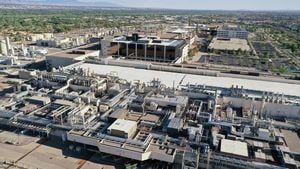Rescue operations are actively continuing following the tragic collapse of a four-storey building in Dar es Salaam, Tanzania, which occurred on Saturday, November 16, 2024. This calamity has upended lives, leading to at least 13 confirmed fatalities and leaving many families grappling with uncertainty as the search for survivors persists. More than 80 individuals have been rescued, but concerns about the number of people still trapped beneath the rubble linger.
The structure, located within the busy trading area of Kariakoo, was more than just bricks and beams; it housed numerous shops and was frequented by locals and visitors alike. On the fateful day of its collapse, cries for help were heard as rescue teams rushed to assist those trapped. Local media reports indicate several family members have lost contact with their loved ones, igniting fears for their safety as rescue efforts continued for the third consecutive day.
Tanzanian President Samia Suluhu Hassan has been proactive following the disaster, personally overseeing the response. On Sunday, she revealed over 20 of the survivors are currently receiving medical treatment, and the government has pledged to cover their medical expenses. Hospital staff are reportedly working diligently to attend to the injured, offering not just physical care but also psychological support for those affected by the collapse.
The president has also taken steps to prevent future tragedies, ordering immediate audits of buildings throughout Dar es Salaam, particularly focusing on the chaotic Kariakoo area. She stressed the necessity for strict adherence to construction regulations and has directed local police agencies to investigate the ownership of the collapsed building alongside determining whether any permits had been officially obtained.
This incident is not merely an isolated event; it highlights systemic issues within Tanzania's construction practices—especially prevalent during the rainy season, which exacerbates the risks of building collapses. Historical data suggests many buildings collapsed during this season are often found to have bypassed safety regulations. Experts express concern about the integrity of structures throughout the country, noting consistent violations of construction codes and regulations could lead to catastrophic consequences.
Adding to the public's anxiety, various sources within the community have described how the government has often been lax in enforcing these regulations. With urban areas like Dar es Salaam continuously growing, the pressure for affordable housing frequently overshadows safety requirements. Images from the scene reveal the devastation left behind by the collapse, and local residents call for immediate accountability and action to prevent future occurrences.
Rescue operations are being conducted by teams of experienced firefighters, paramedics, and volunteers, all battling against time and harsh conditions to reach any survivors still trapped. The emotional weight of the event is palpable as rescue workers struggle, often working long hours, fueled by determination and fury to save lives. The rescue workers face not only the challenge of finding survivors but also the stability of the remaining structure, which poses additional risks.
“We will continue until everyone is safe,” stated one rescue team member, emphasizing their commitment to the harrowing task. Their bravery is matched only by the suffering of those who anxiously await news of friends and family.
The weight of grief hangs heavy over the community, with memorial services planned for those who lost their lives. Military officers have been seen carrying coffins during somber ceremonies, their somber faces reflecting the deep sorrow felt across the nation. These ceremonies serve as stark reminders of the fragility of life and the need for increased safety measures to protect citizens.
Public response has ignited conversations around construction ethics and government accountability. Social media has erupted with calls for reform in building regulations and greater oversight to prevent future tragedies. Many citizens express frustration with the speed of government action and seek immediate reforms to the country’s construction policies.
With such grief surrounding the collapse, it is unprecedented not only as a disaster but also as a turning point for Tanzanian society. Citizens from various backgrounds are rallying together, advocating for improved safety standards and accountability from those overseeing construction projects. The hope is for the government to learn from this tragedy to avert similar tragedies down the line.
This incident raises pressing questions about the existing construction practices and regulations within Tanzania—issues long overshadowed by the urgency for housing and commercial spaces. Community advocates urge the government to implement stricter enforcement mechanisms and greater transparency to prevent future tragedies, enacting laws to protect both lives and livelihoods.
“We want to be sure this doesn’t happen again,” said one resident, their voice thick with frustration and fear. The sentiment is echoed across the community, as voices unite in wisdom and hope for tangible changes and greater respect for building laws.
While searching continues and the grief remains raw, Dar es Salaam's resilience shines through the tragedy. Families are coming together, offering support and counsel, as the city rallies around those affected. Together, they seek justice, healing, and the promise of safer structures to protect the vibrance of their community, ensuring those lost will not have died in vain.
The overwhelming sorrow of this event brings with it the civil obligation for change—the construction might have once been seen as simply utilitarian, but now it becomes intrinsically linked to the very essence of safety and community. The coming weeks and months will see how the Tanzanian government will respond, whether by action or by silence. The community awaits answers and accountability as the rescue efforts continue, bound together by shared sorrow, community strength, and the promise of safety for the future.



